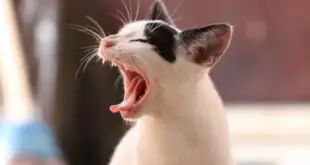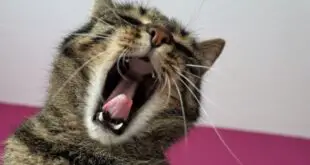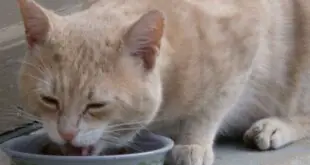This post may contain affiliate links. Please read our disclosure.
If your cat is vomiting blood or blood-tinged liquid, then it means there is a serious health problem with your cat that needs to be addressed promptly.
Explore the causes of cat coughing or sneezing blood and the effective home remedies to use.
Article Contents
Cat Coughing & Sneezing Blood Causes
Indeed, no one wants to see their cats getting sick or being hurt by anyone in their lifetime. Nevertheless, coughing and sneezing are the most common forms of illnesses that affect our cats most.
These forms of the disease are usually worse when our cats are coughing and sneezing blood at the same time.
When most of you see your cats producing blood from their mouth and noses, you usually get absolutely worried. Some even consider their cats as walking dead cats. Indeed it is a sad moment to see your cat in such a situation.
But have you ever taken your time to find out what could be some of the reasons or causes of your cat coughing and sneezing blood?
Here are some of those factors, which you should remember at all times as you can apply them to administer home remedies to your sick cat before taking it to the vet for adequate medication.
- Foreign body – If an outside thing enters your cat’s nose, the cat is likely to sneeze blood.
- Fungal infections – The infections if left untreated can be extremely dangerous to your cat. In particular, your cat will be producing large amounts of blood from its nose and mouth when sneezing and coughing. It is always recommended that you take your cat to a specialist when you notice any form of bleeding.
- Blood clotting disorders – Usually, these disorders are mostly inherited. That means the condition of the inability for blood clotting is passed from either the mother or father cat to the young cat. These disorders are generally dangerous, and if you do not take your cat to the vet on time, it might die due to excessive bleeding.
- Injury – sometimes your cat can get injured when playing or hunting without you noticing it. When that happens, the cat can produce large amounts of blood when coughing and sneezing. It is strongly recommended that you consult with the specialist to effectively treat your cat.
Cat vomiting blood-tinged liquid
Several factors can make your cat to vomit, but when it vomits blood-tinted fluid, there is an absolute need for you to get worried.
Normally when that happens, your cat could be having internal organ bleeding, and that is extremely dangerous.
There are some things that you should do when you notice your cat vomiting bright red blood. First, massage throughout the body to check if it has been hit.
If the cat has been hit you will tell through the expression of pain when you touch the area where the cat was hit. If you discover the area, perform first aid on the cat, before taking it to the hospital.
However, if you do not discover the area, it means your cat could be having an infection that is bleeding its internal organs.
That leads us to the second step, which is taking the cat to the specialist. The specialist has all the required skills and diagnostic tools, which he or she can use to tell the exact cause of your cat vomiting blood.
After examining your cat, the specialists will give you precise instructions and medications which you will administer to your cat.
Please, always adhere to the specialist’s instructions when giving your cat the treatments. Doing the opposite of what you are told could result in the death of your cat.
Cat throwing up blood with hairball
In a week, how many times does your cat produce hairballs and does it have blood? Indeed, if your cat generates hairballs with blood stains more than two times a week, then your cat is sick.
It is vital that when you notice the presence of blood in the hairballs, you take the cat to the veterinarian.
Alternatively, you can contact any vet through social media and explain to him or her about your cat’s condition. He or she will guide you on what to do to establish the reasons why there is blood in your cat’s hairballs.
Blood in cat vomit after eating grass
The cats eat a variety of foods, but in rare cases, the cat can eat grass. In most instances, after eating grass if you are keen, you will notice blood in your cat’s pukes.
Mostly what causes that to happen is the toughness of the grass, which results in the injury of the cat’s internal organs, leading to internal bleeding.
Remember, whenever your cat pukes, and you see blood in the vomits, especially after the cat has eaten grass you are advised to do first aid on the cat and immediately contact the nearest animal hospital.
Home remedies for a cat vomiting bright red blood
In our homesteads, there are several therapies we can use to lessen the symptoms of extreme vomiting in our cats. More especially if the cat is spewing bright red lifeblood.
For instance, you can give your cat pancake syrup to boost your cat’s energy levels due to excessive vomiting.
Or you can give your cat a bland diet containing essential supplements that will help reduce internal bleeding.
Also, in our homes, we have baking soda, sugar, and salt. Mixing all these three components with water and boiling it to make sure it is dissolved results in a Pedialyte-like liquid.
This liquid is given to the cat to help in treating it or lessen the frequency of your cat vomiting to provide you with time to take it to the nearest vet for adequate examination and medication.
References on Cat Vomiting Blood
- Best Home Remedies: Cat Vomiting
- Catster: Cat Sneezing Blood
READ MORE: Cat Coughing Fits at Night
 Petnile Comprehensive Pet Care Guides
Petnile Comprehensive Pet Care Guides



